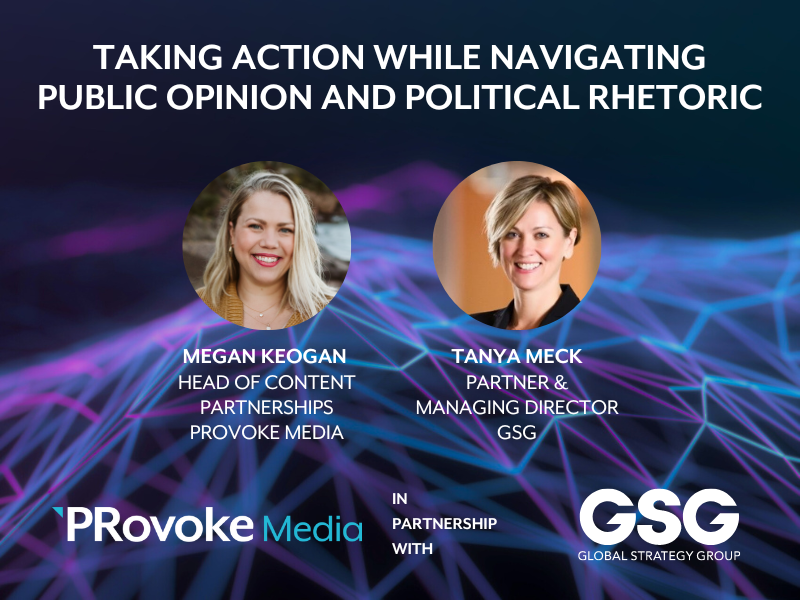Megan Miller 01 Jun 2023 // 9:59PM GMT

For the past decade, Global Strategy Group (GSG) has been publishing its Business & Politics report. In that time, the report has become an influential voice on how the role companies play in social discourse impacts their brand perception. While this year’s covers many of the themes from recent years it also dives deep into the political landscape around recent attacks on companies engaging in environmental social governance initiatives.
In this episode of the PRovoke Media Podcast, Megan Keogan, talks with Tanya Meck, partner and managing director at GSG, about this year’s trends and how companies can protect their brands in a divisive political environment. To kick off the conversation, the two talk about how some things have changed over time, while others have stayed the same.
“If you look at the question: ‘Corporations have a responsibility to bring about social change on important issues facing society…’ [It’s a] straightforward question, We’ve been asking it since before 2017. Over time, the percentage of Americans who agree with that statement has stayed pretty consistent. In 2017 it was 77%, 2022 it was 79%. It has fluctuated as high as 86%, and it has never fallen under 77%. Consistently, that is the answer,” Meck said.
Yes, the social and business environment has changed drastically over the past few years. But, that doesn’t mean companies need to turn their communications or operations upside down. In fact, the GSG research and Meck’s personal experience working with clients show that in the past organizations may have moved too fast, and it’s time to slow down and make more deliberate moves.
“There was a time, even a few years ago, that our clients were weighing in on every current event that was happening,” she said. “The sad fact is, there are too many now, so employees or stakeholders were getting communication fatigue because it was just one CEO or corporate statement after another. So, we’re encouraging our clients to take a look at the top priorities for them — things that directly relate to their business, their communities, their employees. There’s no end of the things that you can address, talk about, create programs and initiatives for, and everybody’s going to be asking you to. But you need to make a matrix so that you can sort of run that through those questions, and say, ‘Yes, this is something that’s really important.’”
More study findings and the full GSG 2023 Business & Politics Report can be found here.
Key moments
0:00 Introductions
6:45 How Perceptions of ESG Have Changed Over Time
10:21 Create Purple Issues: Reframe Polarizing Issues
14:13 Nike Case Study: Polarizing, not Risky
17:44 Disney Case Study: Business Impact from Recent News
21:00 How to Climb Your way out of a Reputation Mistake
26:10 Ways to be Prepared to Respond Externally in Real-Time
31:04 Who Should be a Communications Stakeholder


































.jpg)

















